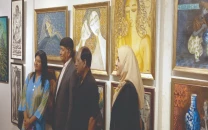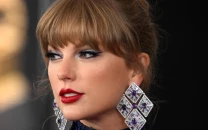Anwar Maqsood’s Haaf Playt: Spicy but stale
The play has a few riveting one-liners and some clever acting but fails to be theatrically engaging.

Despite having a group of promising actors, the play is a sub-standard rendition of PTV’s Half Plate, at best. PHOTOS: PUBLICITY
Old is not always gold and sometimes can verge on being outdated. When Anwar Maqsood, Pakistan’s premiere satirist, took his PTV classic Half Plate to the Arts Council stage as Haaf Playt, he reminded us that some classics are better left untouched. The change in spelling, possibly to avoid copyright infringement is, sadly, the only new thing about the play.
Although the play has some gripping one-liners, it essentially comprises young actors attempting to impersonate legends. Their efforts are worth commending, as it is no small challenge to attempt to fill shoes of acting veterans the likes of the late Moin Akhtar. The minimalist design of a typical household set works, as this version offers more auditory pleasure for the audience than visual stimulation. Despite valiant efforts, Haaf Playt is one of those renditions that could have been restricted to being played over the radio and wouldn’t have created much of a stir.

Directed for stage by Dawar Mehmood, the story revolves around the life of a self-proclaimed intellectual and columnist Mirza Nafees Barelvi (Yasir Hussain) and his wife Bano (Maryam Saleem). They have a typical husband-wife relationship; they indulge in constant bickering, taunt each other about their respective ancestors and exploit each other’s moral weaknesses. Their son Karim Barelvi (Ishtiaq Rasool) personifies his father’s unfulfilled dream; he talks, walks and argues like a poet but pens horrible poetry.
Poverty-stricken, the family lives in its own small world, in which Tamanna (Alizeh), an upcoming poetess mentored by Mirza sahib, sets foot. While she is a breath of fresh air for both the father and son, she turns out to be a major problem for the wife.
As the story unfolds, it leaves the audience with a basic message on morality, which is reminiscent of Maqsood’s writings. Haaf Playt is an orthodox form of morality plays, which is what becomes its central problem. All one gets to see are allegorical characters, who act as moral police for the audience. There is certainly nothing wrong with giving such a message, but the problem lies in the fact that it lacks freshness. This form of wordplay-driven storytelling and theatre was the trend, centuries ago across the world, and decades ago in Pakistan. Modern day Pakistani theatre has evolved and the new breed of artistes has made it more engaging, which results in even lesser room for a play like Haaf Playt.
One can’t help but compare this form of writing to works by the great Umer Sharif, who does the same kind of morality plays — only, he does them in the street and often in cruder language. Given the stark similarity between the narrative tools, techniques and forms that both maestros use, it wouldn’t be surprising to say that Maqsood and Sharif do the same thing, but communicate it differently and have different target audiences.

Having said that, Hussain was great as Mirza sahib and the make-up made him look very similar to the late Akhtar. However, his dialogue delivery and attempt to copy Akhtar’s accent from Half Plate, made it look like his performance was more an imitation than role-playing.
From the movement on stage to the brilliant comic timing, Rasool was inarguably the star of the night, as he clinically portrayed the physical and psychological nuances of a simple yet energetic character. Saleem has a flair for acting, but she still needs to do a lot more theatre to be able to transcend from a purely physical portrayal of her characters to a more psychological manifestation.
Verdict: Watch Haaf Playt if you’re feeling nostalgic, but it will not charm a contemporary audience that is unfamiliar with the original version. Rating: 2.5/5
Published in The Express Tribune, December 12th, 2013.
Like Life & Style on Facebook, follow @ETLifeandStyle on Twitter for the latest in fashion, gossip and entertainment.



















COMMENTS
Comments are moderated and generally will be posted if they are on-topic and not abusive.
For more information, please see our Comments FAQ